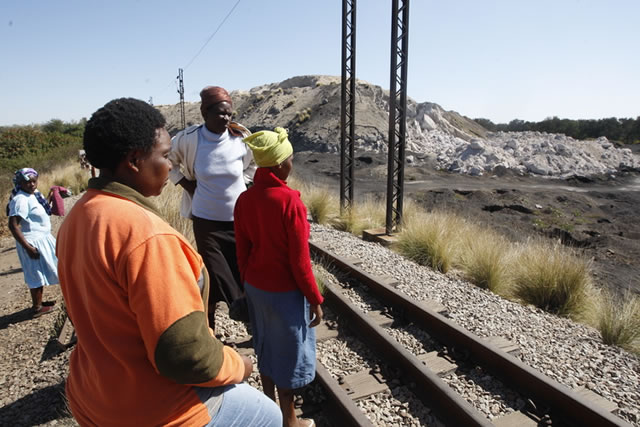Another winter of discontent at Zisco


Open pit . . . Women overlook a mine dump where residents of Torwood scrounge for unburnt coal for resale
Tichaona Zindoga
The story of New Zimbabwe Steel Company, formerly Zisco Steel, is by now well told, especially the plight of workers who have borne the brunt of the demise of the former giant steelmaker.While the unveiling of the new company in August 2011, thanks to Indian investors Essar Holdings, who would partner Government to revive the steel-maker, raised some hope, the fortunes of the workers have not changed.
Workers swing from hope to despair; despair to hope, as announcements of reopening and payment of their dues are made and unmade and made again, in a now all-too-familiar cycle.
The latest of the promises came on May 9 when Government and Essar Holdings announced that workers would be getting their salaries — in fact three months’ salaries — beginning the end of May.
Industry Minister Mike Bimha said: “We have agreed to inject some money into New Zimbabwe Steel and offer relief to the workers. On relief to employees, it was agreed to provide financial and other relief to the employees of Zisco.”
A visit by The Herald a fortnight ago, nearly a month after the announcement, and a week after the lapse of May, revealed a totally different picture.
The money had not come.
Contacted for comment this week, Minister Bimha said he had yet to be briefed on the situation as he had been out of the country.
At New Zim Steel, company secretary Alois Govo, was this week unavailable for comment as he was reportedly out when The Herald repeatedly called his office.
At the time of writing, no joy had come to the workers.
It is yet another month without pay for the workers who last received $50 allowances in March.
After initially being lifted by the news of three months’ full pay, the workers are now despairing.
The news has even brought fresh headaches.
“When we were told that we would receive three months’ pay we were happy and some of us went to borrow money and goods in the belief that we were finally going to get the money,” said one workers who declined to be named.
“Now that we have not been paid, those we borrowed from are unhappy and they can’t believe we have not been paid when the announcement was all over the news,” he said.
Another worker added: “Now that we have not been paid and it’s already more than a week and we need money for rent and food, nobody is willing to lend us because they think we have the money.
“They simply won’t understand,” he said.
Cold silence
The main plant at Zisco is cold and silent.
There is no fire in the furnaces; no smoke in the chimneys.
There is no movement of the giant conveyor belts while a handful of workers, mainly security guards, are seen within the locality of the plant.
A few workers are involved in light maintenance work inside the complex.
In the main residential township for the ordinary worker, Torwood, the gloom is palpable with decaying infrastructure of closed shops and bars, crumbling houses and roads.
Then there is one even gloomier detail.
Torwood has become a place for old men, women and children.
“What can the young men do in this place when the plant is closed?” posed one old timer, who, like many men here, sports a silver head and beard. There is nothing to wait for and all the young artisans left as soon as the company closed. That is what also happened when the company’s football team was relegated. All the good players left because they could not play in Division One. The team was relegated from the lower division and eventually folded,” he said.
A foreboding of such a cruel fate is inevitable in relation to Zisco.
Many of the old men who are seen in Torwood seem to be holding just for the chance of a last dance with the company they joined in the late 1970s.
They have worked at the company all their lives and many of them are of Malawian origin.
All they seem to look for are modest payouts from the company so that they eventually settle down.
Thankfully the company sold them the houses they live in.
Some workers who have retired in the past four years have not received their pensions.
Understandably, the workers are bitter, confused and even irritable.
“I have worked for 38 years at this company but I had never gone through the suffering such as the one we are going through,” said one 63-year-old belt-man. We do not know who is behind the stalling of the project, whether it is Government or the investor . . . we are fed up with the empty promises,” he said.
Mistrust
There is also a lot of mistrust among the workers and workers’ representative organisations.
Workers live in fear of victimisation for talking to the media.
Some have allegedly been dismissed for venting their frustrations and expressing hopes for the company.
Workers’ unions, which should be open about the situation, choose to be tight-lipped — and there are two reasons for this.
First, they fear victimisation and secondly, in the uncertainty of the current situation, they fear the media might be overtaken by events and they come out as having misrepresented their constituencies.
The Herald had a tough time trying to talk to the workers’ representatives.
The Zimbabwe Iron and Steel Workers Union, a Zimbabwe Federation of Trade Unions affiliate, refused to speak as officials threw off responsibility on one another.
A representative of artisans also refused to comment.
It took the Zimbabwe Iron and Steel Union of Zimbabwe, a Zimbabwe Congress of Trade Unions of Zimbabwe affiliate, to open up on the plight of workers.
The chairman, Akim Mujokeri, confirmed that they had not received payment and that his members were becoming restless.
“We have been trying to engage management but we are being put off as they say they will brief us since the matter is being handled by the Government,” he said.
Mujokeri’s position is invidious.
Caught between the 1 000 or so workers he represents, who are sometimes cynical, and an often inhospitable management, he finds himself under a lot of pressure.
Mujokeri said he would not buckle under the pressure, even when dismissal for being outspoken hung over him like the Sword of Damocles.
Yesterday, reporting that nothing had materialised for the long suffering Zisco workers, he reminded the employer: “You must not muzzle the ox that thrashes your corn.”
Women
The observation that in times of crisis it is the women and children who suffer the most holds true of the women at Zisco.
They have suddenly become the breadwinners as they go to nearby farms to look for jobs and sell trinkets in exchange for food.
Most women have resorted to scrounging for fine coal from mine dumps which is a dirty and unhealthy exercise.
They sell the coal to brick manufacturers who buy a 25kg bag of the coal for $1,20.
The women say they make about $45 a week.
One cannot sell anything in Torwood.
“No-one has the money and who do you sell to?” asked one woman.
“The situation is hard for us as women because you know we cannot even afford sanitary ware when the time for our periods comes,” she said.
The women are seeing their children go hungry and drop out of school.
Some students that sat for “O” and “A” Level national examinations last year have not yet collected their results because they owe their schools some monies.
The situation may only get worse for the people of Torwood and at the moment, they are facing another winter of discontent.








Comments